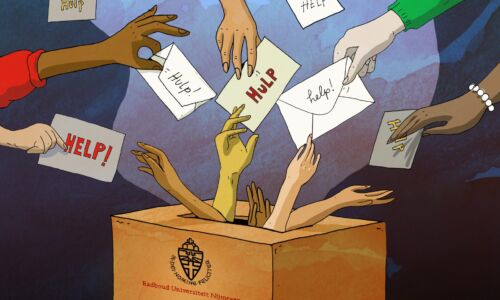International law has limited influence in Qatar: ‘The World Cup has cost human lives’
-
 Lusail Stadium in Doha, Qatar. Foto via WikiCommons
Lusail Stadium in Doha, Qatar. Foto via WikiCommons
With the approaching kick-off of the football World Cup, the public debate about Qatar as the host country is reaching its climax. What role does international law play when it comes to improving human rights in the country? Legal expert Annick Pijnenburg will give a current affairs lecture on this topic tomorrow at Radboud Reflects.
Thousands of migrant workers died during the construction of stadiums and hotels. An ambassador of the World Cup recently spoke of homosexuality as ‘an illness of the brain’. Human rights in Qatar are being put under the microscope as the World Cup unfolds in the country next Sunday.
Annick Pijnenburg, assistant professor in International and European law, will give a current affairs lecture on this tomorrow, together with historian Paul Reef.
What are the main allegations against Qatar?
‘Human rights violations take place everywhere. Even in the Netherlands. But in Qatar, there are many worries when it comes to that issue. Women and the LGBT community face discrimination. And in the context of the World Cup, there are many concerns about the rights of migrant workers.’
‘Elements of the kafala system remain in practice’
‘In the Gulf States, by tradition, there is a system of kafala, in which migrant workers are strongly dependent on their employer. They often need to hand in their passport, and cannot just switch to another employer. The country recently abolished this system, presumably because of the World Cup and the additional external pressure. Although some elements of the kafala system remain in practice.’
Does Qatar violate any international treaties they have signed?
‘In 2018, Qatar ratified two important human rights treaties of the United Nations. However, the conditions in Qatar suggest that they are not complying with these treaties. Migrant workers do not have decent housing, for example. Some people even speak of modern slavery.’
What can be done against this?
‘Although Qatar has ratified the UN treaties, the country does not give access to international complaint mechanisms. Because of this, you cannot file a complaint if you are a victim of a human rights violation. There is also no Arabic equivalent of the European Court of Human Rights.’
‘On the national level, we have laws. If you or me break those, we can be taken to court. That doesn’t exist on the international level. International law is mostly made by states, who may or may not choose to be bound by those rules. If they violate international agreements, there is no international police force to enforce the law.’
Are there no other ways to bring Qatar to justice?
‘Within the UN, there is still the Human Rights Council. There, countries give each other feedback on how they deal with human rights. The last time it was Qatar’s turn, the position of migrant workers was brought up. But that remains a political game.’
‘The World Cup has indirectly had a positive impact’
‘A country can also sometimes file a complaint against another country, for example at the International Court of Justice in The Hague or at the Human Rights Committee in Geneva. But this also rarely happens, so as to not antagonise other countries. What remains is politics and international pressure.’
And can the FIFA and the construction companies not be held accountable for the suffering of migrant workers?
‘That is very complicated. International human rights law is set up in such a way that individuals have rights, and countries have duties. Traditionally, organisations like FIFA or construction companies have no such obligations. In 2014, the Confederation of Dutch Trade Unions (FNV) did start a lawsuit against the FIFA, but that case was dismissed by a Swiss judge (where the headquarters of FIFA are located, ed.).’
Was it not better to not have had Qatar host the World Cup?
‘When it comes to human rights in Qatar, it seems that, because of international pressure, the World Cup has indirectly had a positive impact. But I doubt that the benefits outweigh the costs. The World Cup has cost human lives. The question also is whether the positive developments will remain after the World Cup.’
‘A broader issue is that countries with a good human rights record don’t want to host the World Cup, because it is too expensive. Countries such as Qatar, China, and Russia see these types of events as a good way to do some sportswashing: the World Cup is an important PR tool for them and a way to put themselves on the map.’
The current affairs lecture of Radboud Reflects takes place tomorrow at 12.30 pm in Theatre Hall C. It will be held in English. More information can be found here.
Translated by Jan Scholten



